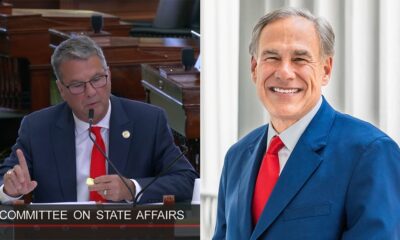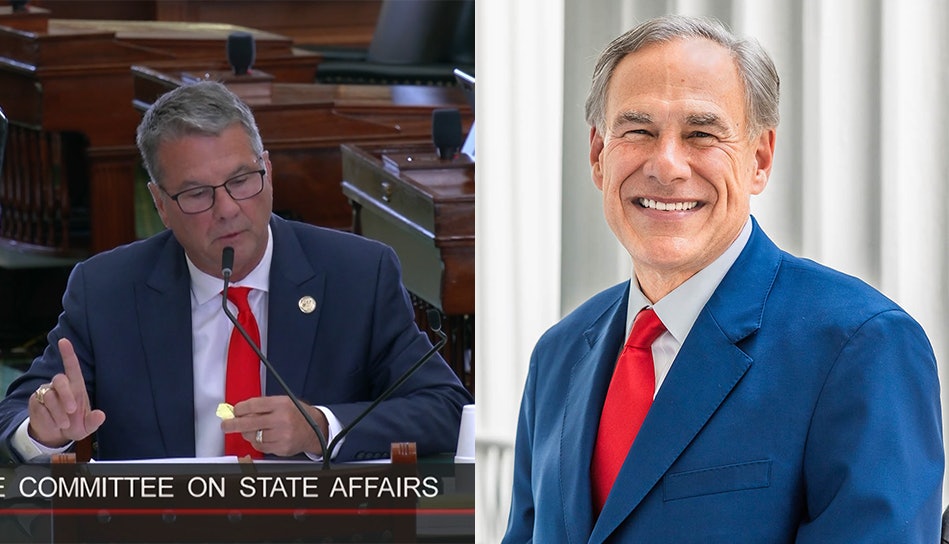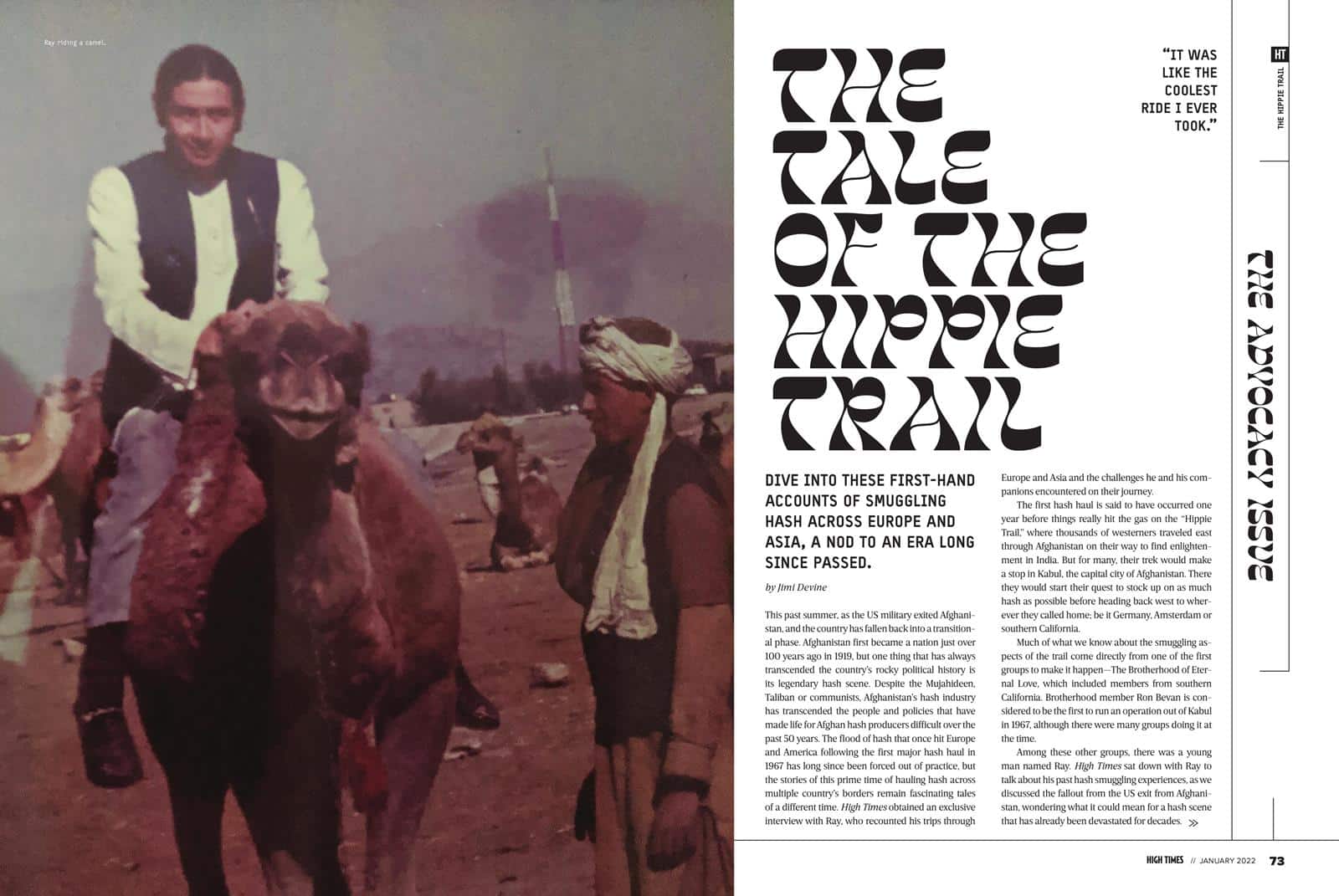featured
MINNESOTA WANTS YOU! (To Name Its New Official THC Gummy)
Published
10 hours agoon

Minnesota’s relationship with weed is getting more creative by the minute.
As the state rolls out its recreational cannabis sales in 2025, one city is already making headlines with a bold, very berry-flavored move: launching its own line of government-branded THC gummies. But that’s not all. They’re asking residents to help name them.
Welcome to Eden Prairie, a Minneapolis suburb that just became the first municipality in Minnesota to put out a city-sponsored weed edible. Crafted “specifically for sleep,” each mixed-berry gummy contains 5mg of THC and 30mg of CBN, a cannabinoid known for its calming properties. The 10-packs will be sold at local Eden Prairie Liquor stores for $19.99, starting this fall.
“This isn’t just any gummy. It’s our gummy,” the city declared in its call for submissions. “It deserves a name as bold, vibrant, and unforgettable as the Eden Prairie community itself.” What are they looking for? Basically: the best, brightest or weirdest name idea.
The rules are simple:
- You must be 21 or older and live in Eden Prairie.
- No profanity, politics, or self-referential names.
- One entry per person.
- Submissions open through July 29.
- The top 3 names will be posted on Facebook for public voting August 4–8.
- The winner gets their chosen name on the product—and a free gummy pack!
That’s right. Legal weed, straight from the city… and your idea could be all over it.
Local control + legal creativity
While Minnesota legalized adult-use cannabis in 2023, dispensaries won’t open statewide until next year. In the meantime, hemp-derived THC products like these gummies are completely legal under a 2022 law that quietly kickstarted a green rush in gas stations, liquor stores, and even state fairs.
Now, cities like Eden Prairie are taking things into their own hands.
“Beer and wine sales are down. The category of growth is THC,” said Paul Kaspszak, Executive Director of the Minnesota Municipal Beverage Association. “The future is now, so you might as well find any advantage you can.”
Municipal cannabis isn’t new to Minnesota, either; at least 13 cities and counties have applied to operate their own dispensaries. Cities like Anoka and Osseo are already building facilities in anticipation of OCM (Office of Cannabis Management) approvals.
Tribes like the White Earth Nation are already running cannabis shops outside their reservations, thanks to a deal signed by Governor Tim Walz allowing up to eight tribal stores statewide. Meanwhile, OCM just issued Minnesota’s first official cultivation license last month, marking the first steps in a broader, regulated adult-use rollout.
But, why a sleep gummy?
Turns out, sleep support is one of the largest in-demand use cases for THC in the state’s emerging edible market.
“The No. 1 thing we’ve seen people coming in and wanting is a beverage or gummy that will help at night,” said Eden Prairie Liquor’s Jaime Urbina. “This is a community option.”
With that in mind, the city clearly pays attention and brings solutions to its citizens by crafting a gentle but effective edible-focused efforts. The high dose of CBN paired with low-dose THC is ideal for people looking to wind down.
Thus, this gummy is more than a mere THC product: it’s a local legacy, a vibe, and a chance to make weed history as a community.
So if you’re from Eden Prairie, it’s time to get creative.
Send this to your Minnesotan friends and tell them: NAME! THAT! GUMMY!
Cover photo: James Montgomery Flagg, Public domain, via Wikimedia Commons (edited)

Author: mscannabiz.com
MScannaBIZ for all you Mississippi Cannabis News and Information.
You may like
-


Guess Who Is A Big Supporter Of Legalizing Marijuana
-


How much do states make from marijuana tax?
-


Texas Governor Clarifies Hemp THC Stance as Senate Committee Approves Ban
-


Cannabis industry faces federal roadblocks as states that legalize generate billions
-


The Tale of the Hippie Trail (2022)
-


Vaporized Cannabis Mitigates Migraine Symptoms
featured
Guess Who Is A Big Supporter Of Legalizing Marijuana
Published
44 minutes agoon
July 23, 2025
The struggle continues to match federal policies with the majority of the public, but there is emerging a potential new ally.
As cannabis rescheduling is languishing in DC, a striking shift has taken place. Guess who is a big supporter of legalizing marijuana? A broad bipartisan consensus is forming around cannabis legalization—with Republicans increasingly joining the push. Polling from Pew Research reveals 88% of U.S. adults believe cannabis should be legal in some form—whether for medical or recreational purposes
RELATED: Gen Z Increasing Alcohol Intake Without Cutting Cannabis
Among those embracing the shift are Republican voters and leaders. In fact, a 2024 survey by Fabrizio, Lee & Associates, whose principal, Tony Fabrizio, served as pollster for GOP Republican candidate’s 2016 and 2024 campaigns, found GOP voters are even more supportive than the general public of allowing states to set their own cannabis laws. A striking 72% of Republican voters supported state-level autonomy on marijuana, compared to 68% of voters overall.

This aligns with a broader conservative trend favoring limited federal government and local control. Increasingly, Republican lawmakers argue that cannabis regulation should be a state issue—not a federally enforced one-size-fits-all policy.
Another driver of change: baby boomers and seniors. Once the backbone of anti-drug sentiment, older Americans are now among the growing base of legalization supporters. Pew’s data shows nearly half of Americans 65 and older support both medical and recreational cannabis, and only one in five oppose legalization entirely.
This evolution reflects not only shifting cultural attitudes but also growing recognition of cannabis’s medical potential, especially among older adults managing chronic pain or illness.
Many Republicans also see a fiscal opportunity. Legal cannabis generated over $2 billion in tax revenue in Colorado and over $1 billion in California, funding education, infrastructure, and health programs. Nationally, over half of Americans (52%) say legalization positively impacts local economies.
RELATED: More Boomers Are Embracing Cannabis
States facing budget shortfalls—some led by GOP governors—are increasingly looking to cannabis as a revenue source. Iowa, for example, is reportedly considering legalization as a solution to fill financial gaps left by tax cuts.
While economic arguments dominate, justice reform plays a role too. Pew’s data shows 42% of Americans believe legalization makes the criminal justice system fairer, with only 18% disagreeing. With bipartisan concern over mass incarceration, Republican lawmakers are now exploring cannabis reform as a step toward justice system balance.
As cannabis legalization moves from fringe to mainstream, Republicans are reshaping the narrative. Backed by strong voter support, economic incentives, and shifting generational views, cannabis policy is becoming a bipartisan cause—and a politically savvy one heading into 2026. If only the administration would pay attention.

Author: mscannabiz.com
MScannaBIZ for all you Mississippi Cannabis News and Information.
featured
Texas Governor Clarifies Hemp THC Stance as Senate Committee Approves Ban
Published
2 hours agoon
July 23, 2025
Texas Gov. Greg Abbott specifically called on state lawmakers to regulate hemp-derived products in his proclamation for a special session earlier this month, but the chief executive further explained his position on July 22.
Abbott, who vetoed Senate Bill 3 last month in the regular session—legislation that aimed to implement a blanket ban on consumable hemp products containing detectable amounts of THC or other intoxicating cannabinoids—clarified his stance with multiple news outlets this week.
Specifically, Abbott is calling on the Legislature to:
- ban all cannabinoid hemp products for those younger than 21 years of age;
- ban consumable products containing synthetic cannabinoids, such as delta-8 THC; and
- regulate a hemp industry for adults to ensure that products intended for human consumption don’t exceed 0.3% THC or 3 milligrams of THC.
“Let me be clear: I stand in favor of doing all we can to protect the lives of our children while also protecting the liberty of adults,” Abbott told Fox 4 on Tuesday. “With regard to adults … we do want the THC level to be below 0.3% or … 3 milligrams of THC; it’s called nonintoxicating levels of hemp that would be marketed.”
The governor said his vision includes a highly-regulated system where there would be enforcement checks throughout the supply chain, from hemp farmers to wholesalers, manufacturers, distributors and retailers.
“The only way we’re going to be able to do this is through tough enforcement,” he said. “The money for enforcement would come from all the market participants, and we would create an enforcement structure like what we have in the alcohol system that would ensure that the [Texas Alcoholic Beverage Commission] would be involved in the process.”
Abbott also made clear that he wants Texas to continue to criminalize nonmedical cannabis possession and sales despite Lt. Gov. Dan Patrick claiming that the governor wants to “legalize recreational marijuana” following the June 22 veto of S.B. 3. As the presiding officer of the Senate, Patrick spearheaded S.B. 3’s blanket ban in the regular session.
Despite Abbott’s call to regulate consumable hemp products in the special session, Sen. Charles Perry, R-Lubbock, filed S.B. 5 to kick off the 30-day special session on July 21. The legislation mirrors S.B. 3’s intent: to ban consumable hemp products containing any amount of THC or other intoxicating cannabinoids, providing exceptions only for nonintoxicating CBD and CBG.
S.B. 5 received a hearing in the Texas Senate State Affairs Committee on July 22, when Perry told lawmakers that hemp-derived THC products “is not a regulatable situation.”
Perry said that Texas businesses manufacturing and selling intoxicating hemp products voluntarily “play roulette because they know we don’t have the enforcement in place nor the regulatory framework to ever stay ahead of the chemistry.”
Before the committee voted, 10-0, to advance S.B. 5, its members invited law enforcement officials to provide testimony in support of the legislation, including Allen Police Chief Steve Dye and Chambers County Sheriff Brian Hawthorne.
In particular, Dye said he was representing roughly 1,700 members of the Texas Police Chiefs Association, serving as the organization’s sergeant at arms.
“It is the opinion of the Texas Police Chiefs Association that no amount of personnel or resources in a state this large with this many locations will ever be effective in regulating these dangerous products, which is why the ban is the only viable solution to protect our community from these harmful products,” Dye said.
While there are roughly 8,000 hemp THC product retailers in Texas, the Texas Alcoholic Beverage Commission (TABC) regulates more than 50,000 licensed businesses and more than 100,000 out-of-state producers and distributors each year, according to the TABC.
Hawthorne testified on behalf of the Sheriff’s Association of Texas, which he serves as president.
“Since 2019, we’ve allowed Texas to become a de facto recreational drug state,” Hawthorne said. “And by we, I mean all of us in government: state leadership, state regulatory agencies, law enforcement and prosecutors. We all have failed to prevent the proverbial camel nose from peaking under the tent. The camel we fight against is recreational marijuana. Under the false label of hemp, we have allowed illegal marijuana and THC products to infiltrate our state.”
While some law enforcement officials claim Texas’ hemp THC industry has become too big to regulate, Abbott said he sees it differently.
“Every law enforcement official I’ve talked to has said the same thing, and that is they don’t have the resources to regulate it,” the governor said. “And if they had the resources to be able to regulate it, they would be able to do it, for one. For another, if they’re measuring the hemp product, not based upon the current methodology of 0.3% THC, but on the milligram basis, it’s a whole lot easier to be able to measure it.”
After the Senate State Affairs Committee provided its invitees unlimited time to testify in support of S.B. 5, the body limited all others to two minutes.
Many of those who testified in opposition to the legislation presented similar stances to their previous fight to defeat S.B. 3: They support regulations to age-gate products to deny access to those under 21 years old; to prohibit sales near schools, parks, playgrounds and other areas frequented by children; to require product testing and ensure accurate labeling; and to prevent products and packages from being marketed in manners attractive to children.
Texas consumable hemp product stakeholders also continued to point out that their industry provides millions of dollars in tax revenue and employs some 50,000 workers.
Meanwhile, Todd Harris, the co-owner of Austin-based The Happy Cactus Apothecary, questioned why lawmakers in the state capitol were back pushing the hemp THC ban after Abbott said the special session should revolve around regulation.
Editor’s note: According to the Texas Constitution, “there shall be no legislation [in special session] upon subjects other than those designated in the proclamation of the governor calling such session.”
Harris also scolded Perry for pointing to a court decision in Arkansas as justification for his legislation to ban hemp THC products in Texas.
“Texas does not take its cues from Arkansas,” Harris said. “Texans have spoken for themselves loudly, clearly. You’ve heard the facts, and consistently from veterans to farmers, small business owners, to everyday consumers, the message is the same: We don’t want to ban. We want safe access, fair regulation, freedom of choice, not government overreach, which frankly, this bill feels less like Texas values and more like big government in disguise.”
Harris also pointed out that The Happy Cactus, with two licensed hemp shops in Austin, does not provide access to those under 21 years old.
“We serve over 15,000 adult customers every single year,” he said. “They come back two to three times a month. Not one of them is under 21. And we know this because we card every customer, just like we card Lieutenant [Governor] Dan Patrick in our shop. Our regulars include teachers, EMS workers, veterans, seniors, contractors, and even doctors—pretty wild. If these products were truly dangerous, why would respected professionals rely on them month after month? The truth is these products are helping people.”
RELATED: Texas Lieutenant Governor ‘Carded’ at Compliant Austin-Based Hemp Retailer
Earlier in the hearing, Perry claimed that Texas hemp stores have had seven years to age-gate customers but have failed to do so, adding that age-gating has “never worked out,” pointing to kids who drink and drive, saying that age-gating is “just another cover to legitimize a bad thing.”
Although youth access is often cited as a concern among prohibitionists, a report recently released by the Washington State Liquor and Cannabis Board shows that licensed and regulated cannabis dispensaries were 95% compliant in age-gating purchases in 2024, compared to 88% for the tobacco industry, 83% for the vape industry and 77% for the liquor industry.
Harris said that he worried elected officials in Texas are “intentionally distorting the truth” to push a hemp THC ban that’s driven by special interests over public interests.
“We know Dan Patrick took money from alcohol companies to push this ban,” Harris said. “So, Senator Perry, I truly hope that you haven’t taken money from alcohol companies as well.”

Author: mscannabiz.com
MScannaBIZ for all you Mississippi Cannabis News and Information.

This past summer, as the US military exited Afghanistan, and the country has fallen back into a transitional phase. Afghanistan first became a nation just over 100 years ago in 1919, but one thing that has always transcended the country’s rocky political history is its legendary hash scene. Despite the Mujahideen, Taliban or communists, Afghanistan’s hash industry has transcended the people and policies that have made life for Afghan hash producers difficult over the past 50 years. The flood of hash that once hit Europe and America following the first major hash haul in 1967 has long since been forced out of practice, but the stories of this prime time of hauling hash across multiple country’s borders remain fascinating tales of a different time. High Times obtained an exclusive interview with Ray, who recounted his trips through Europe and Asia and the challenges he and his companions encountered on their journey.
The first hash haul is said to have occurred one year before things really hit the gas on the “Hippie Trail,” where thousands of westerners traveled east through Afghanistan on their way to find enlightenment in India. But for many, their trek would make a stop in Kabul, the capital city of Afghanistan. There they would start their quest to stock up on as much hash as possible before heading back west to wherever they called home; be it Germany, Amsterdam or southern California.
Much of what we know about the smuggling aspects of the trail come directly from one of the first groups to make it happen—The Brotherhood of Eternal Love, which included members from southern California. Brotherhood member Ron Bevan is considered to be the first to run an operation out of Kabul in 1967, although there were many groups doing it at the time.
Among these other groups, there was a young man named Ray. High Times sat down with Ray to talk about his past hash smuggling experiences, as we discussed the fallout from the US exit from Afghanistan, wondering what it could mean for a hash scene that has already been devastated for decades.
Hop In—We’re Going Smuggling
The days before Ray’s first trip to Afghanistan were filled with proper hippie business. “We went to southern Oregon in the late ’60s and for whatever reason out of pure synchronicity a bunch of us from northern California and southern California all ended up in this one house in southern Oregon,” Ray told High Times.
The group decided to take things to the next level and looked to start a commune. They spent some time hunting for a property, but after some hiccups with the search, they regrouped in California in 1968. A lot of the people that originally tossed that idea around remain friends to this day after originally finding each other all those years ago.
Part of that group included some friends who had already been smuggling hash from Afghanistan a year or two before that, and they had just brought back a load. In those days, Ray and his friends were staying in the High Sierras—the perfect place to unload some hash.
Most people associate the “Hippie Trail” with the image of a classic Volkswagen bus and a Hanomag Camper that rolled up to their spot in the same hills that was also very popular with other hash smugglers, such as Darrell. “He came, we unloaded it there, and it took a while. And after he got what he thought was the load amount he goes, ‘Okay, you guys can have the rest.’ And so we picked away at it because it was in the framework,” Ray said, “We had to use all kinds of tools we implement to dig it all out but I think eventually we got like another 10 pounds.”
This would be the first time Ray mentioned the man that he eventually partnered with to make the travel east. “So you know we are quite thrilled to make a connection with him. This is Long Beach, brother, I can give you his name because he’s no longer with us. Well, he had many names, but we knew him as Darrell,” Ray noted with a laugh.
Before connecting with Ray, Darrell had already made two or three trips. He was always a driver, and for good reason. In this critical role, he was the main person who drove from Holland to Kabul and back, through every border. He didn’t even need a map when he was on his runs.
Eventually Darrell shared his next plan with Ray: “Here’s what I want to do next time because I’m gonna have another Honomag, but also I’m going to buy a really nice motorhome,” Darrell told Ray at the time.
The motorhome was called a Revcon. It was the top-of-the-line in 1968 when it was designed. It had an aerodynamic aluminum body, and the 26 rails that ran the length of its frame were a hash smuggler’s dream.
“Very cool, very modern, front wheel drive. And he goes ‘I’m gonna buy this and we’re gonna, this is the vehicle we’re gonna make special rails that go inside the rails and we’ll have little hooks to pull it out,”’ Ray said of Darrell’s original plan.
Ray and Darrell had some friends that were engineers who helped them with building the rails. Eventually they would drive the Revcon across the country from California to New York, shipping it on to Rotterdam, Netherlands.
Darrell asked Ray to tag along for the full run to Afghanistan. “I go, ‘Sure, I’ll go slide and sit shotgun,”’ Ray replied. “It was like the coolest ride I ever took. But we were vegetarian at the time, so we were doing a lot of soups, avocados and carrot juice. We had it all decked out with the Norwalk Press, which is a real good juicing machine. We totally kept our eating habits intact.” Their eating habits would eventually earn them the nickname “The Carrot Juice Boys.”
The group prepped for their journey from Rotterdam after picking up the Revcon. They would make their way through Germany and Austria, then travel through Yugoslavia, Bulgaria, Turkey and Iran before finally reaching the Afghan Border.
That first trip would end up taking a few months, after Ray and Darrell got caught up in eastern Turkey. The Revcon’s front wheel drive engine featured torsion bars in the front, which didn’t pair well with the traffic or potholes they encountered on their journey. They lost control of the Revcon for a second, but were able to come to a stop in the center median. “Eastern Turkey is definitely the sticks, very isolated and very desolate,” Ray said of the breakdown.
When you break down out there, it’s common to surround your vehicle with rocks. They did so before hitchhiking to the closest town. They brought mechanics back to the Revcon, knowing they wouldn’t be able to replace the bar, but could rig something to get the Revcon back to civilization.
They hobbled into Tehran, Iran and messaged home for the part they needed. It wasn’t a fast process. “So we were in Tehran for about a good month, repairing the vehicle, but everything got straightened down,” Ray said, “So we rolled into Afghanistan, probably in late summer of 1970.”
Of Science and Borders
The mission was to obtain a couple hundred pounds of hash and five gallons of hash oil. While other groups had brought hash loads back for about three years before this trip, to the best of The Carrot Juice Boys’ knowledge, they were the first people ever to bring a flash evaporator to Afghanistan. Much of the Revcon was loaded with Everclear for their grand chemistry project.
If the idea of driving across the middle east with a chemistry set seemed weird, the opulence of the Revcon stole everyone’s attention at each border crossing, simplifying getting its contents across various borders in both directions. “I mean, they’ve seen the ‘Hippie Trail’ in the VW Vans, the Honomags, but they’ve never seen anything of this magnitude in this amazing really cool motorhome,” Ray noted on the border crossings. “And of course once we got into Persia we decked it out with Persian carpets and runners and it was looking really cool.”
They were very much playing the part of rich Californians, but they would still be pulled from the line at every border. “The head custom guy would come out and just wanted to go inside and look at it and say ‘oh very nice,”’ Ray said, “It’s just amazing.”
One time, a border agent pulled out their chemistry set and pulled out a beaker. He asked Darrell and the pair what it was. “Glass,” they replied. The border guard looked at it again, nodded in agreement with their take, and put it back in the box.
Iran had some of the toughest border restrictions, but once you entered the country, the group found that it was amongst the most welcoming as they attempted to Westernize before the Shah fell in 1979. Ray emphasized that it was one of the nicest places he’s ever been to, as they spent the month waiting for car parts. “They just want to make sure you’re [not] smuggling weapons or anything, doing nefarious stuff, but all the people there were so nice,” Ray noted of Tehran. “They just were so hospitable and helped us [with] whatever. If we’d go looking for the embassy, [residents] would take us in their car, take us to their home, feed us and then take us to the embassy.”
But with a repaired Revcon, things got a bit rougher as they approached the Afghanistan border. Every hotel featured signs that warned a prison sentence of 10 years in prison for a gram of hash, and life in prison for a kilo. “They try and put the fear in you, but we got some good hash in Turkey,” Ray said with a laugh.
After getting into Afghanistan, the group headed straight for Kabul. They stayed in a fancy neighborhood fitting of rich Californians. From there, they would head to The Solan Hotel, a hotspot for hash enthusiasts and general tourists heading in both directions on the trail.
One of Ray’s favorite things about The Solan Hotel was a space attached to the courtyard where you could park your van and camp near a little park attached to the hotel. There was always an ongoing rotation of Europeans and a few Americans, and it was always a good time.
The locals did their best to keep the hippies and smugglers happy, too. “Afghanis just loved us because we had money and we were very careful about religion,” Ray said. “We were very aware of how they are and how not to trespass or do anything [that] goes counter to them. There’s just some things so you don’t mess with. You don’t eat during the day during Ramadan and walk around chewing food.”
But Ray argued that besides that kind of thing, the religion of Islam was based in hospitality. Over the course of three trips that, in total, took about a year to complete, Ray picked up some language skills. One of the things he noticed immediately was how caring and personal everything was. He noted that a lot of the conversation focused on how the other person was feeling.
Back in their Kabul neighborhood, they rented out a two-story mansion and set up the hash lab. They would do a lot of the extraction work offsite and then bring the crude material back to the flash evaporator in the bathroom to get all the alcohol out. It would take them a couple of months to get the five gallons of hash oil they were shooting for.
“THEY JUST WERE SO HOSPITABLE AND HELPED US [WITH] WHATEVER. IF WE’D GO LOOKING FOR THE EMBASSY, [RESIDENTS] WOULD TAKE US IN THEIR CAR, TAKE US TO THEIR HOME, FEED US AND THEN TAKE US TO THE EMBASSY.”
Unloading the Goods
High Times asked Ray how much hash they needed to make the five gallons. Ray estimated that about 200 kilos were concentrated into the oil. He also noted the unpressed hash made for much better oil, then they hid the rest to stuff in the specialized frames of the Revcon. “The rest we had pressed up and put into the containers, the square tubes, it actually ended up making the hash look like a Hershey bar. We sold most of that in Amsterdam and I’m sure to this day, there are a lot of people there who call it ‘screw hole hash,’” Ray said.
The hash received this name when they put five to seven of the bars together and put a screw through the stack, just to tighten it up before they tossed it down the tube designed to fit into the Revcon’s internal storage system. “It was a precise measurement that we had all the patties pressed,” Ray noted on the precision used to fill each tube with as much product as possible.
As for the oil, that came out pretty great, too. The flash evaporator kept the oil at a reasonable temperature as it sweat off the Everclear used in production. “I mean, it was a black oil. But because of the flash evaporator we didn’t have to heat it in a high temperature, it was in a vacuum, so you got the real essence of really, really good hash,” Ray said. “I don’t know if you’ve had really, really good hash but it’s very floral and very sweet.”
Just like today, in order to make the best oil possible, they had to get their hands on the best material possible. Ray described the process that took them around the country from their upscale Kabul hash lab and base camp. The first connection they ever made was in Kandahar, Afghanistan.
“We used to go to Kandahar, but that was a tough place to be,” Ray noted on the trip. “Kandahar was like going back 1,000 years. I was like ‘Oh my God. That was an ancient town.’ And you couldn’t help but get dysentery just hanging out there for any amount of time. But Kabul was more modern.” In addition to the more modern vibe in Kabul, you could basically get whatever you needed. And in reality, it wasn’t that competitive with other smugglers in town because there was just so much hash to go around.
When it was time to return, the Revcon would leave Afghanistan without Ray. They hired a German woman to play the role of a fancy lady with a fancy motorhome. “We paid her like $10,000 or something. And she was great! She had like a fur coat. I mean, she’d look the part of being wealthy,” Ray said. She was the perfect accessory for a driver who had already completed this trip five times before. The key was the balance of looking like a regular person. Not being an asshole, but also not being too nice, in the hopes of getting waved through borders smoothly.
Ray and Darrell made it to Holland with no problems. The Revcon worked like a charm before being unloaded on a small farm outside Amsterdam. Most of the load would be sold locally.
“But here’s a luggage story for you,” Ray laughed. While the hash moved in Europe, they decided to bring a bunch of the oil back to America. At the time, Ray estimated that the oil was selling for about $10 a milliliter, so a whole liter was worth roughly $10,000 bucks. “We went to a liquor store in Amsterdam and bought Kahlua. Then we’d melt the little seal and stretch it and pull it over the bottle, undo the cap and pour out all the Kahlua and then poured in the hash oil. Then we heated the seal back up and you know back the cap and so it looked sealed, and we’d take two bottles,” Ray said. “So, we go to the airport and we’d go to the duty free and buy another bottle of Kahlua and we traded out the bottle we bought at duty-free. So, we just carried it right across check-in.”
Ray emphasized not to forget the exchange rate. That $10,000 bottle in 1970 would be worth over $70,000 today. He can’t recall how many bottles made it back, the whole five gallons would be worth $1.2 million today.
Adapting the Experience
On Ray’s two trips to Afghanistan, he already had the lay of the land. He flew into Kabul and would buy the hash ahead of time to limit the time spent in the country compared to the marathon road trip and hash oil production of his inaugural adventure.
Ray’s first trip lasted so long he actually overstayed his visa. When he returned for the second run the customs people at the airport noticed it on his passport and gave him a shorter amount of time. After learning his lesson, he got a new passport for the third run. It did the trick, and it was clear sailing at customs. “So, I’d go ahead of time and get there and order up and make sure everything’s ready,” Ray said, “So when the vehicle came through it wasn’t just there, it was like it was going across. It wasn’t there longer than a week or two, which is about the average tourist time somebody might spend there.”
The later runs wouldn’t feature the Revcon. The team moved on to four-wheel drive Suburbans with special compartments in the gas tank that could hold over 100 pounds of gas. The only problem with it was you had to stop a lot more to fuel up, but the trucks did a lot better on the roads than a motorhome.
“But it was pretty safe because to get to it you’d have to take out the whole gas tank and cut into it,” Ray said, “And that was the last time that we did it. We actually hired a professional race driver, who was a dear friend, and he did a good job.”
The gang had a mission of wider psychedelic enlightenment between trips. As they made the runs through the early 1970s, a lot of the resources went into furthering that mission. The freedom Ray and his peers were in search of came with the smuggling and they wanted to make sure to pay it forward. What would start as personal projects for the group would eventually end up in the hands of nonprofits down the line in the form of an unfinished boat. “So the majority of the money that we ever made went on that boat, eventually when the Russians started coming in and put in the puppet government and everything we said, ‘okay, that’s done. We’re not going back there again,”’ Ray said.
Expanding Lore of the First Smuggler
Three years prior to Ray’s first run, Ronnie Bevan of the Brotherhood of Eternal Love would make the first major smuggling run out of Afghanistan. He released the first autobiography of a hash smuggler entitled Brotherhood Hashish: The Story of Ronnie Bevan in 2018.
Many people speak of the “Hippie Trail” as intertwined tales of the many tourists that passed through and a handful of preeminent smugglers like him. High Times asked Bevan to weigh in on that idea. “One thing was there was more than just the two,” Bevan quickly rebutted. “You could get on a bus in London and end up in Kathmandu and there are photos of those people going in 1967 or 1968. The girls have bouffant hairdos and they’re in tight skirts. And then you see him a year later in Kathmandu, and we’re in the hippie clothes and their hair is all down.”
Bevan found that was really the basic motivation of the of the European travelers. Thousands of Europeans made that trip, but very few Americans did, because of the overseas aspect. “We didn’t have the buses. There just weren’t that many. I know, all of the guys that were in Afghanistan smuggling because I was there through several years, and there just weren’t that many,” Bevan said.
Bevan explained that a lot of people in London, or wherever they went from, by the time they got to Nepal all of a sudden they were into the metaphysical side of everything and taking psychedelics. But not everyone. Some people were there for the opposite of self-help. “There also was another large group of people that just did drugs,” Bevan explained, “You could buy heroin, cocaine, you could buy either from the pharmacy in Afghanistan. And consequently, we saw a lot of druggie type people just hanging out. So that’s just another dimension to what you’re talking about.”
Technically, many date the “Hippie Trail” to beginning in 1968, one year after Bevan’s first run. Bevan went on to explain how those increased crowds impacted business. “In the early days nobody got busted for anything, it wasn’t until 1971 that somebody busted [in] one of the vans,” Bevan said.
By 1973, Bevan and his friends had a warrant poster, and he was on the run. That same year Afghanistan’s King Zahir Shah made hash illegal following a $47 million dollar payment from the US government. “Our people had to move into Pakistan to do their work, and it was pretty much destroyed after that. And then it faltered and then a lot of people got busted and especially in those Volkswagens. I think about eight of them, and from that point on, none of them made it they got every one of them but when the Russians came [in] 1979 it was over for sure. That it’s, been over since then.”
A recent article in the South China Morning Post spoke with a cannabis farmer and hash producer outside of Kandahar named Ghulam Ali. Ali noted he hasn’t had any problems since the most recent transition of power, despite concerns that the Taliban would crack down a lot more than the coalition-backed government that fell last summer. “We don’t hear a lot over there. But I think the Taliban is pretty much leaving everything alone,” Bevan replied after reading Ali’s story. “I think what they’re doing is they’re trying to get in there economically.”
It’s also important to remember that hash and Afghanistan have a much longer history than the Taliban does with the nation. “And I think the Taliban probably see that and realize that the people are going to be much happier and much easier to deal with if they let them have their culture,” Bevan argued.
This article appears in the January 2022 issue of High Times. Subscribe here.

Author: mscannabiz.com
MScannaBIZ for all you Mississippi Cannabis News and Information.

Guess Who Is A Big Supporter Of Legalizing Marijuana

How much do states make from marijuana tax?

Texas Governor Clarifies Hemp THC Stance as Senate Committee Approves Ban

Cannabis industry faces federal roadblocks as states that legalize generate billions

The Tale of the Hippie Trail (2022)

Vaporized Cannabis Mitigates Migraine Symptoms

Total Massachusetts Adult-Use Cannabis Sales Have Surpassed $8 Billion

Oklahoma Marijuana Activists Plan Push To Put Legalization On Ballot Despite New Petioinining Restrictions

Trulieve Expands Distribution of Onward, Launches THC-Infused Energy Drink Upward

State: marijuana dispensaries surpass $8B in gross adult-use sales

Trump’s VA Secretary Wants To ‘See People Healed’ With Psychedelics, But They’re ‘Tied Up With Regulation’

Missouri Supreme Court rules marijuana taxes can’t be stacked

Trump’s DEA pick confirmed as cannabis rescheduling awaits (Newsletter: July 23, 2025)

Chuck Nice dishes about comedy show at New Jersey cannabis store

MINNESOTA WANTS YOU! (To Name Its New Official THC Gummy)

Ont. man charged in child cannabis poisoning case

Missouri Official Says New Marijuana Testing Protocol Shouldn’t Disrupt Businesses

Texas Constitution May Bar Lawmakers From Hemp THC Ban in Special Session

15 Entrepreneurs Building The Future Of Mushrooms Around The World

South Dakota Farmers See Hemp As A Way To Bring Jobs To Small Towns And Absorb Carbon

Cannabis Industry Stakeholders React to DEA Head Terrance Cole’s Confirmation

THE WISDOM OF OZ (1999)

New North Dakota Medical Cannabis Reforms Set to Take Effect Aug. 1

Missouri Supreme Court’s Marijuana Ruling Says Cities And Counties Cannot Stack Local Taxes

Alert: Department of Cannabis Control updates data dashboards with full data for 2023

Connecticut Appoints The US’s First Cannabis Ombudsperson – Yes there is a pun in there and I’m Sure Erin Kirk Is Going To Hear It More Than Once!

5 best CBD creams of 2024 by Leafly

EU initiative begins bid to open access to psychedelic therapies

Free delta-9 gummies from Bay Smokes
New Study Analyzes the Effects of THCV, CBD on Weight Loss

May 2024 Leafly HighLight: Pink Runtz strain

5 best autoflower seed banks of 2024 by Leafly

Mississippi city official pleads guilty to selling fake CBD products

Curaleaf Start Process Of Getting Their Claws Into The UK’s National Health System – With Former MP (Resigned Today 30/5/24) As The Front Man

Discover New York’s dankest cannabis brands [September 2024]

Horn Lake denies cannabis dispensary request to allow sale of drug paraphernalia and Sunday sales | News

Local medical cannabis dispensary reacts to MSDH pulling Rapid Analytics License – WLBT

Press Release: CANNRA Calls for Farm Bill to Clarify Existing State Authority to Regulate Hemp Products

Nevada CCB to Accept Applications for Cannabis Establishments in White Pine County – “Only one cultivation and one production license will be awarded in White Pine County”

5 best THC drinks of 2024 by Leafly

The Daily Hit: October 2, 2024

6 best CBD gummies of 2024 by Leafly

5 best delta-9 THC gummies of 2024 by Leafly

Weekly Update: Monday, May 13, 2024 including, New Guide for Renewals & May Board meeting application deadline

People In This State Googled ‘Medical Marijuana’ The Most, Study Shows

PRESS RELEASE : Justice Department Submits Proposed Regulation to Reschedule Marijuana

Thailand: Pro-cannabis advocates rally ahead of the government’s plan to recriminalize the plant

Press Release: May 9, STIIIZY and Healing Urban Barrios hosted an Expungement Clinic & Second Chance Resource Fair
Trending
-

 California Cannabis Updates1 year ago
California Cannabis Updates1 year agoAlert: Department of Cannabis Control updates data dashboards with full data for 2023
-

 Breaking News1 year ago
Breaking News1 year agoConnecticut Appoints The US’s First Cannabis Ombudsperson – Yes there is a pun in there and I’m Sure Erin Kirk Is Going To Hear It More Than Once!
-

 best list12 months ago
best list12 months ago5 best CBD creams of 2024 by Leafly
-

 Business10 months ago
Business10 months agoEU initiative begins bid to open access to psychedelic therapies
-

 Bay Smokes1 year ago
Bay Smokes1 year agoFree delta-9 gummies from Bay Smokes
-

 cbd1 year ago
cbd1 year agoNew Study Analyzes the Effects of THCV, CBD on Weight Loss
-

 California1 year ago
California1 year agoMay 2024 Leafly HighLight: Pink Runtz strain
-

 autoflower seeds10 months ago
autoflower seeds10 months ago5 best autoflower seed banks of 2024 by Leafly


